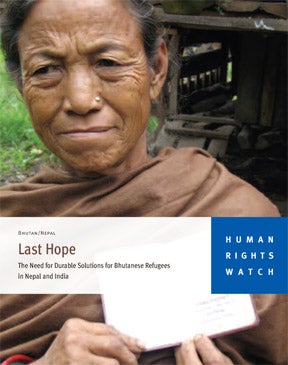Last Hope

This 86-page report discusses the possible solutions to this protracted refugee situation and the choices the refugees now face. It describes conditions of the ethnic Nepali refugees who have languished in exile in Nepal and India, and also documents continuing discrimination against the ethnic Nepalis still living in Bhutan, who live in fear that they too could be stripped of their citizenship and expelled from the country.
In the early 1990s tens of thousands of ethnic Nepalis were arbitrarily deprived of their Bhutanese citizenship. Some were then expelled from Bhutan, while others fled the country to escape from a campaign of arbitrary arrest and detention directed against the ethnic Nepalis. For sixteen years these Bhutanese refugees have languished in seven refugee camps in Nepal with no resolution to their plight. In October 2006, however, the United States announced its willingness to resettle up to 60,000 of the refugees. While the U.S. resettlement offer has given hope to many of the Nepali-speaking refugees, now numbering some 106,000, the lack of clear information about the resettlement offer or about the prospects for other durable solutions, namely repatriation to Bhutan or local integration in Nepal, has resulted in increasing anxiety and tensions among the refugees. Some opponents of resettlement have threatened refugees who speak out in favor of resettlement, leaving many refugees fearful of expressing their thoughts on their future. Furthermore, the fate of the remaining 46,000 refugees and of an estimated10,000-15,000 unregistered refugees in Nepal and 15,000-30,000 unregistered refugees in India remains unclear.